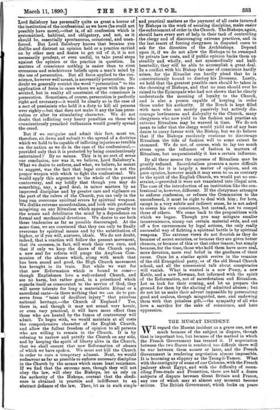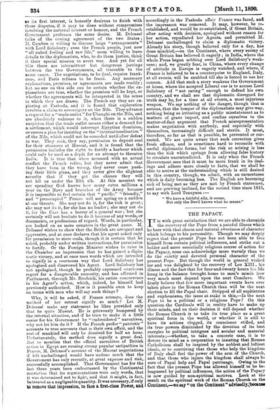THE MUSCAT INCIDENT.
WE regard the Muscat incident as a grave one, not so much because of the subject in dispute, though that is important too, but because of the method in which the French Government has treated it. If negotiation between the two States is rendered too difficult there will be war between them sooner or later, and the French Government is rendering negetiation almost impossible. It is becoming as slippery as the Tsung-li-Yamen. What with the contiguity of some of our Colonies, with the French jealousy about Egypt, and with the difficulty of recon- ciling Free-trade and Protection, there are half a dozen subjects of dispute between Great Britain and France, any one of which may at almost any moment become serious. The British Government, which looks on peace as its first interest, is honestly desirous to finish with these disputes, if it may be done without compromises involving the national interest or honour, and the French Government professes the same desire. M. Delcasse talks of the coming agreement of the two States ; M. Cambon is willing to discuss large " arrangements " with Lord Salisbury ; even the French people, just now "all naked feeling and raw life," seem willing to leave details to the diplomatists, who, to do them justice, think it their special mission to avert war. And yet for all this there are intermittent but dangerous jarrings between the two Governments, all traceable to the same cause. The negotiations, to be final, require frank- ness, and Paris refuses to be frank. Any necessary explanations, promises, or agreements are made readily ; but no one on this side can be certain whether the ex- planations are true, whether the promises will be kept, or whether the agreements will be interpreted in the sense in which they are drawn. The French say they are ex- ploring at Fasboda, and it is found that exploration involves a claim to sovereignty on the Nile. They advance a request for a "trade outlet" for Ubanghi on the Nile, and. are absolutely welcome to it, when there is a sudden suspicion that the trade outlet means either a demand for a settlement, which would interrupt Egyptian dominion, or covers a plan for insisting on the " internationalisation " of the Nile, which could not be conceded until after defeat in war. They seek, they say, permission to deposit coal for their steamers at Muscat, and it is found that the permission includes the right to fortify a harbour which could only be used as a depot for an attempt to threaten India. It is true that when menaced with an actual conflict the French retire, but they never admit that they have been in the wrong, they never cease push- ing their little plans, and they never give the slightest security that if they get the chance they will not hit us under the fifth rib. At this moment we are spending God knows how many extra millions a year on the Navy and branches of the Army because it is impossible to feel certain that "pacific," "friendly," and "preoccupied" France will not spring on a sudden at our throats. She may not do it, for the risk is great ; she may not do it, for she has no leader ; she may not do it, for the Czar has a horror of a general war ; but she certainly will not hesitate to do it because of any words, or documents, or professions of regard. Words, in particular, are looked on as mere counters in the great game. M. Delcasse wishes to show that the British are arrogant and oppressive, and at once declares that his agent asked only for permission to store coals, though it is certain that he asked, probably under written instructions, for permission to fortify. Or the Foreign Minister wishes to raise in the Chamber an impression that he has gained a diplo- matic victory, and at once uses words which are intended to signify in a courteous way that Lord Salisbury has apologised and disavowed his Agent. Lord Salisbury has not apologised, though he probably expressed courteous regret for a disagreeable necessity, and has affirmed in Parliament, through Mr. Brodrick, his entire concurrence in his Agent's action, which, indeed, he himself had previously authorised. How is it possible even to keep on terms with men who will say such things ?
Why, it will be asked, if France retreats, does the method of her retreat signify so much ? Let M. Delcass6 make any statement he likes provided only that he quits Muscat. He is grievously hampered by the internal situation, and if he tries to make it a little easier for his Government by " embroidered " narratives, 'why not let him do it ? If the French prefer" patriotic" accounts to true accounts that is their own affair, and the rest of mankind will only be deceived for half an hour. Unfortunately, the method does signify a great deal. Not to mention that the official narratives of British action in Egypt are rousing strong popular antipathies in France, M. Delcasses account of the Muscat negotiations if left unchallenged would have undone much that the Government has only recently, at great expense and risk, successfully accomplished. That Government has for the last three years been embarrassed by the Continental conviction that its representations were only words, that it was determined not to fight, and that it might, in fact, be treated as a negligeable quantity. It was necessary, if only to remove that impression, to face a first-olass Power, and accordingly in the Fashoda affair France was faced, and the impression was removed. It may, however, be re- established, and would be re-established, if Great Britain, after acting with decision, apologised without reason for her action, repudiated her Agents, and. permitted M. Delcasse unchallenged to claim a diplomatic victory. Already his story, though believed only for a day, has done mischief,—on the Continent, where every enemy of Great Britain has believed it eagerly ; in India, where the whole Press began sobbing over Lord Salisbury's weak- ness; and, we greatly fear, in China, where every change of attitude in Europe is eagerly watched, and where, if France is believed to be a counterpoise to England, Italy, at all events, will be snubbed till she is forced to use her cannon. Add that each a story weakens the Government at home, where the accepted Liberal cue is to accuse Lord Salisbury of "not caring" enough to defend his own country, and we shall see that diplomatic disregard for truth may be, for a time at all events, a most injurious weapon. We say nothing of the danger, though that is serious, that the temper of the diplomatists may give way, nothing being so irritating as a public misstatement as to matters of grave import, and confine ourselves to the matter-of-fact argument that French misrepresentation makes negotiation with anybody, and especially with themselves, increasingly difficult and sterile. It must, therefore, so far as that is possible, be prevented or cor- rected. We are quite aware that such correction gives fresh offence, and is sometimes hard to reconcile with useful diplomatic forms, but the risk so arising is less than the risk which springs from allowing false history to circulate uncontradicted. It is only when the French Government sees that it must be more frank in its deal- ings and adhere more closely to facts, that we shall be able to arrive at the understanding which is still desired in this country, though, we admit, with an earnestness which is daily becoming less. The English are becoming sick of being met as they are met by French statesmen, and are growing inclined, for the second time since 1815, to say with Lord Tennyson :— "We have a faithful ally, it seems.
But only the Devil knows what he means."







































 Previous page
Previous page